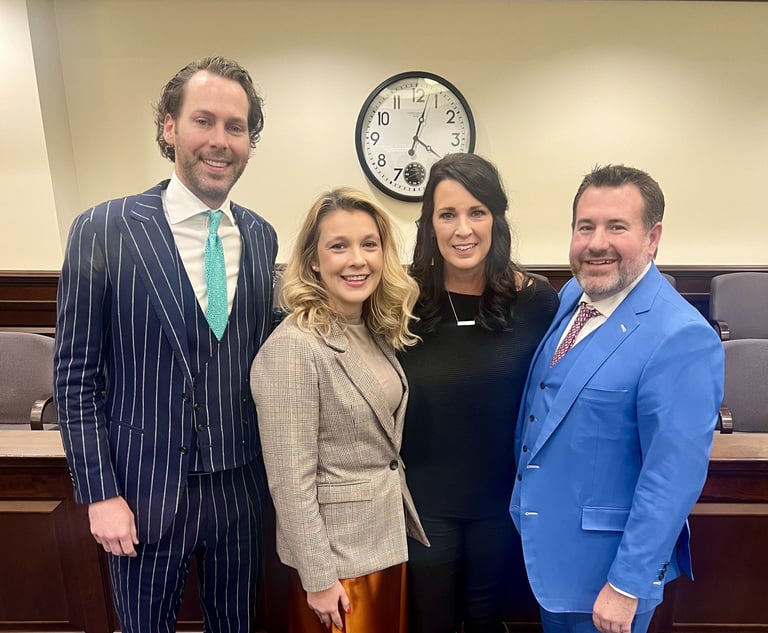Ruling on Reach of Pa. Justices' 'Seismic' UIM Decision Clears Way for Class Action
James Haggerty of Haggerty, Goldberg, Schleifer, & Kupersmith in Philadelphia, who argued the appeal on the plaintiff's behalf, said the decision is significant for all post-'Gallagher v. Geico' litigation—of which there has been plenty—because the judge "considered all of the limitations carriers have been trying to impose on 'Gallagher' and rejected them."
March 05, 2020 at 02:53 PM
4 minute read
 Photo credit: Rawpixel.com/Shutterstock.com
Photo credit: Rawpixel.com/Shutterstock.com
A federal judge in Pennsylvania has barreled through a number of roadblocks the insurance industry has attempted to put up for plaintiffs in the wake of the state Supreme Court's "seismic" 2019 decision in Gallagher v. Geico, which invalidated the use of the "household vehicle exclusion" to bar stacked uninsured and underinsured motorist benefits.
In a Feb. 27 opinion in Stockdale v. Allstate Fire & Casualty Insurance, U.S. District Judge Wendy Beetlestone of the Eastern District of Pennsylvania denied Allstate Fire and Casualty Insurance's motion for summary judgment and granted plaintiff Kayla Stockdale's motion for summary judgment in a putative class action, one of several similar lawsuits alleging insurance companies have improperly used household exclusions to bar stacked coverage since as far back as 1990.
Stockdale had sought to stack UIM coverage under her parents' Allstate policy (referred to in the opinion as the "Sanders policy") with the UIM coverage provided under her own policy (referred to as the "Stockdale policy"). Allstate, however, denied the claim, citing the household exclusion provision in her parents' policy, which informed the insured that no UIM coverage would be available "to you or a resident relative" injured in a vehicle that wasn't specifically covered by that policy.
In seeking summary judgment in Stockdale's suit, Allstate argued that the Gallagher decision had limited reach beyond the specific facts in that case.
Beetlestone rejected that notion, however.
"Allstate's assertion that the Pennsylvania Supreme Court intended Gallagher to be a 'narrow' decision is misleading," the judge said. "Allstate makes much of a footnote stating that '[o]ur focus here is narrow.' That phrase, however, was written in the context of explaining that the majority's opinion did not endanger other, non-household coverage exclusions such as 'exclusions related to racing and other inherently dangerous activities' and does not narrow the scope of its holding as to the household exclusion."
Instead, Beetlestone continued, "The Pennsylvania Supreme Court must be presumed to have meant what it said when it wrote that 'household vehicle exclusions should not and cannot operate as a pretext to avoid stacking' and that 'these exclusions are unenforceable as a matter of law,' and this court declines to read any limiting language into that clear pronouncement."
Allstate also sought to factually distinguish Stockdale's case from Gallagher, which involved an insured who had attempted to stack UIM benefits across two Geico policies—one for his motorcycle and one for his automobiles. Allstate argued that, unlike the plaintiff in Gallagher, Stockdale had not purchased stacking on her own policy and the two policies she sought to stack coverage across had been purchased by two different insureds.
But Beetlestone said both of those factual distinctions between the two cases were "irrelevant," noting that while Stockdale had not purchased stacking on her own policy, her parents had paid for coverage for all "'resident relative[s]'" in their household.
"Here, it is undisputed that Stockdale is making a claim under the Sanders policy and that she was an insured under that policy," Beetlestone said. "Because it is also undisputed that the Sanders did not waive stacked coverage, and because a household exclusion 'cannot operate as a pretext to avoid stacking' or a 'de facto waiver' of stacked coverage, the household exclusion in the Sanders policy is 'unenforceable as a matter of law.'"
While a class has not yet been certified in the case, James Haggerty of Haggerty, Goldberg, Schleifer, & Kupersmith in Philadelphia, who argued the appeal on Stockdale's behalf, said Beetlestone's summary judgment ruling clearly enunciated the two requirements potential class members will need to meet: (1) the policy under which they've made a claim must provide for stacked coverage and (2) that coverage must have been denied on the basis of a household exclusion provision.
Haggerty said Beetlestone's decision is significant for all post-Gallagher litigation—of which there has been plenty—because the judge "considered all of the limitations carriers have been trying to impose on Gallagher and rejected them."
Counsel for Allstate, Mark Levin of Ballard Spahr in Philadelphia, could not be reached for comment on the decision.
This content has been archived. It is available through our partners, LexisNexis® and Bloomberg Law.
To view this content, please continue to their sites.
Not a Lexis Subscriber?
Subscribe Now
Not a Bloomberg Law Subscriber?
Subscribe Now
NOT FOR REPRINT
© 2025 ALM Global, LLC, All Rights Reserved. Request academic re-use from www.copyright.com. All other uses, submit a request to [email protected]. For more information visit Asset & Logo Licensing.
You Might Like
View All
Harrisburg Jury Hands Up $1.5M Verdict to Teen Struck by Underinsured Driver
3 minute read
Philadelphia Eagles 0-2 in Attempts to Recover Insurance on COVID-Related Losses
4 minute read
High Verdicts and Venue Rule Land Pa. Courts on Top of 'Judicial Hellhole' List
5 minute read
Law Firms Mentioned
Trending Stories
- 1States Accuse Trump of Thwarting Court's Funding Restoration Order
- 2Microsoft Becomes Latest Tech Company to Face Claims of Stealing Marketing Commissions From Influencers
- 3Coral Gables Attorney Busted for Stalking Lawyer
- 4Trump's DOJ Delays Releasing Jan. 6 FBI Agents List Under Consent Order
- 5Securities Report Says That 2024 Settlements Passed a Total of $5.2B
Who Got The Work
J. Brugh Lower of Gibbons has entered an appearance for industrial equipment supplier Devco Corporation in a pending trademark infringement lawsuit. The suit, accusing the defendant of selling knock-off Graco products, was filed Dec. 18 in New Jersey District Court by Rivkin Radler on behalf of Graco Inc. and Graco Minnesota. The case, assigned to U.S. District Judge Zahid N. Quraishi, is 3:24-cv-11294, Graco Inc. et al v. Devco Corporation.
Who Got The Work
Rebecca Maller-Stein and Kent A. Yalowitz of Arnold & Porter Kaye Scholer have entered their appearances for Hanaco Venture Capital and its executives, Lior Prosor and David Frankel, in a pending securities lawsuit. The action, filed on Dec. 24 in New York Southern District Court by Zell, Aron & Co. on behalf of Goldeneye Advisors, accuses the defendants of negligently and fraudulently managing the plaintiff's $1 million investment. The case, assigned to U.S. District Judge Vernon S. Broderick, is 1:24-cv-09918, Goldeneye Advisors, LLC v. Hanaco Venture Capital, Ltd. et al.
Who Got The Work
Attorneys from A&O Shearman has stepped in as defense counsel for Toronto-Dominion Bank and other defendants in a pending securities class action. The suit, filed Dec. 11 in New York Southern District Court by Bleichmar Fonti & Auld, accuses the defendants of concealing the bank's 'pervasive' deficiencies in regards to its compliance with the Bank Secrecy Act and the quality of its anti-money laundering controls. The case, assigned to U.S. District Judge Arun Subramanian, is 1:24-cv-09445, Gonzalez v. The Toronto-Dominion Bank et al.
Who Got The Work
Crown Castle International, a Pennsylvania company providing shared communications infrastructure, has turned to Luke D. Wolf of Gordon Rees Scully Mansukhani to fend off a pending breach-of-contract lawsuit. The court action, filed Nov. 25 in Michigan Eastern District Court by Hooper Hathaway PC on behalf of The Town Residences LLC, accuses Crown Castle of failing to transfer approximately $30,000 in utility payments from T-Mobile in breach of a roof-top lease and assignment agreement. The case, assigned to U.S. District Judge Susan K. Declercq, is 2:24-cv-13131, The Town Residences LLC v. T-Mobile US, Inc. et al.
Who Got The Work
Wilfred P. Coronato and Daniel M. Schwartz of McCarter & English have stepped in as defense counsel to Electrolux Home Products Inc. in a pending product liability lawsuit. The court action, filed Nov. 26 in New York Eastern District Court by Poulos Lopiccolo PC and Nagel Rice LLP on behalf of David Stern, alleges that the defendant's refrigerators’ drawers and shelving repeatedly break and fall apart within months after purchase. The case, assigned to U.S. District Judge Joan M. Azrack, is 2:24-cv-08204, Stern v. Electrolux Home Products, Inc.





